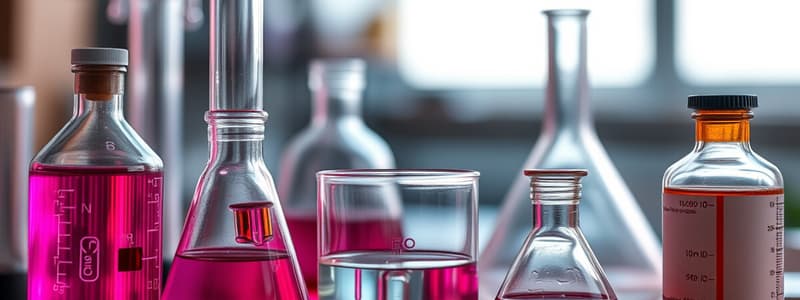Podcast
Questions and Answers
What is the difference between physical change and chemical change?
What is the difference between physical change and chemical change?
Physical changes can be easily reversed, while chemical changes are more permanent and involve the formation of new substances.
What happens to atoms during a chemical reaction?
What happens to atoms during a chemical reaction?
During a chemical reaction, atoms do not change into those of another element; instead, there is a rearrangement of atoms.
What is formed when magnesium burns in air?
What is formed when magnesium burns in air?
- Magnesium Oxide (correct)
- Magnesium Sulfate
- Magnesium Chloride
- Magnesium Carbonate
Chemical changes can be easily reversed.
Chemical changes can be easily reversed.
The powder formed when magnesium burns is called _______.
The powder formed when magnesium burns is called _______.
Flashcards are hidden until you start studying
Study Notes
Preface
- Reference Study Material created for Class X Chemistry tailored to the 2017-18 CBSE syllabus.
- Aims to simplify complex topics to aid understanding, especially for weaker students.
- Includes NCERT book questions and their answers, fostering confidence with foundational problems before advancing to Higher Order Thinking Skills (HOTS) questions.
- Expresses gratitude to various educational leaders for their support and encouragement in preparing this material.
- Open to feedback and corrections to improve future editions.
Dedication
- Material dedicated to Late Shri M.S. Mallayya, the author's father.
Chapter 1: Chemical Reactions and Equations
- Changes can be classified into physical (easily reversible) and chemical (permanent).
- Chemical changes result in the formation of new substances, differing from the original.
- A key aspect of chemical reactions is the rearrangement of atoms, without any atom changing into a different element.
- Example: Burning magnesium ribbon creates magnesium oxide with a dazzling white flame:
- Reactants: Magnesium (ribbon) + Oxygen (from air).
- Product: Magnesium Oxide (white powder).
- Chemical reactions involve energy changes; in this example, heat is released during reaction.
Studying That Suits You
Use AI to generate personalized quizzes and flashcards to suit your learning preferences.




